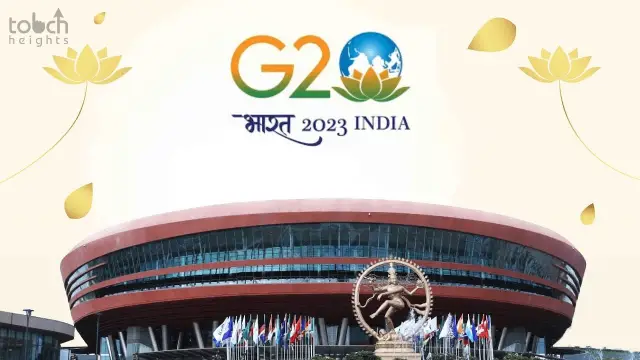The Group of Twenty (G20) summit is a pinnacle event that unites the world’s largest economies, featuring 19 countries and the European Union. It serves as an annual platform for leaders to engage in discussions concerning international economic and financial matters. The 18th Heads of State and Government Summit of the G20 convened in September 2023 in the vibrant city of New Delhi, India, under the leadership of the Indian Presidency. The summit was guided by a profound theme – ‘One Earth, One Family, One Future’. This theme guided discussions during the event.
Setting the Stage: New Delhi, India

The 2023 G20 Summit marked a historic occasion as it was the first time this grandiose gathering of leaders convened in India. The event took place at the Bharat Mandapam International Exhibition-Convention Centre, Pragati Maidan, New Delhi, on the 9th and 10th of September. India’s vibrant and diverse culture provided a rich backdrop for meaningful discussions on the global economy.
Agenda Priorities: Charting the Path Forward

G20 India’s presidency laid out six key agenda priorities for the 2023 G20 Summit:
- Green Development, Climate Finance & LIFE
Addressing climate change was at the forefront of discussions. With a focus on green development and sustainable finance. The G20 leaders recognized the urgency of tackling environmental challenges and made significant commitments towards a cleaner, greener future. - Accelerated, Inclusive & Resilient Growth
Inclusive economic growth that benefits all segments of society was a major concern. Leaders discussed on strategies to ensure economic resilience and inclusivity in a rapidly evolving global landscape. - Accelerating Progress on SDGs
The Sustainable Development Goals (SDGs) took center stage as the G20 members pledged to fast-track progress towards achieving these vital global objectives. This commitment reinforced their dedication to eliminating poverty, ensuring quality education, and promoting gender equality, among other critical goals. - Technological Transformation & Digital Public Infrastructure
The digital revolution’s transformative power was acknowledged, with discussions revolving around harnessing technology for the benefit of society. Digital public infrastructure emerged as a key aspect, underlining the importance of unbiased access to digital resources. - Multilateral Institutions for the 21st Century
Another pressing concern was reforming and strengthening global institutions to meet the needs of the modern world. The G20 leaders explored ways for enhancing the effectiveness of international organizations. - Women-Led Development
Recognizing the pivotal role of women in economic development, the summit placed a spotlight on women-led initiatives. Strategies for promoting gender equality and women’s empowerment were at the forefront of discussions.
Thematic Priorities: Navigating Global Challenges

The Indian Presidency of the G20 Summit placed a strong emphasis on six thematic priorities:
- Food Security
Ensuring food security for all was a top priority. Leaders discussed strategies to address food shortages, distribution challenges, and the impact of climate change on agriculture. - Climate and Energy
Addressing climate change was a recurring theme, with a commitment to triple global renewable energy capacity by 2030 and phase down unabated coal power. The summit recognized the critical role of clean energy in achieving a sustainable future. - Health
The global health landscape, especially in the context of the ongoing pandemic, was a matter of intense discussion. Leaders explored strategies for pandemic response, healthcare access, and the equitable distribution of vaccines. - Education
The importance of quality education was emphasized, highlighting the need to ensure access to education for all, particularly in the face of disruptions caused by the pandemic. - Trade
Trade policies and practices took center stage, with leaders focusing on ways to promote international trade that benefits all nations and fosters economic growth. - Investment
Promoting responsible and sustainable investment was crucial. Leaders discussed strategies for attracting investment that aligns with environmental and social objectives.
Key Takeaways: A Path Towards Sustainability

The 2023 G20 Summit yielded several key takeaways that hold immense significance for global development:
- Commitment to Renewable Energy
G20 leaders committed to tripling global renewable energy capacity by 2030, signaling a significant step towards a more sustainable future. - Phasing Down Coal Power
Acknowledging the environmental impact, the summit highlighted the need to phase down unabated coal power, aligning with global efforts to reduce carbon emissions. - Environmentally Responsible Choices
The importance of environmentally sustainable and responsible choices at both individual and national levels was emphasized, underlining the collective responsibility to protect the planet.
Embodying “Vasudhaiva Kutumbakam”: One World, One Family

The Indian Presidency of the G20 Summit encapsulated the timeless concept of “Vasudhaiva Kutumbakam” – the belief that the world is one family. This ethos guided the summit’s proceedings, fostering a spirit of collaboration and cooperation for the greater good of humanity. The G20 leaders reaffirmed their commitment to low-carbon emissions, climate resilience, and environmentally sustainable development pathways. Additionally, the summit called for an end to “religious hatred,” including acts against religious symbols and holy texts, promoting global harmony.
A Joint Statement: A Vision for the Future
.jpg)
The G20 leaders reached a consensus on a comprehensive joint statement that covered a wide array of economic issues. While specific details of the joint statement are not available in the public domain, it underscores the commitment of G20 nations to address global challenges collectively.
Addressing Global Issues: Ukraine-Russia Conflict and Pandemic Recovery

The G20 Summit serves as a critical platform for addressing global issues that transcend national boundaries. The 2023 summit was instrumental in facilitating discussions on the Ukraine-Russia conflict, with President Putin’s attendance being a pivotal moment. The summit reiterated the importance of environmentally sustainable choices and embodied the spirit of “Vasudhaiva Kutumbakam.” The commitment to renewable energy and the phasing down of coal power also marked significant progress in addressing pressing global challenges.
Apart from the conflict, the summit focused on pandemic recovery, recognizing the profound impact of the global health crisis on economies and livelihoods. President Biden’s call for meaningful debt relief for low- and middle-income countries highlighted the G20’s role as leaders in the global economy. Policymakers stressed the importance of supporting vulnerable populations, protecting the planet, and leveraging digital advancements for the benefit of all. Education, employment, trade, and investment were also central to these discussions.
Conclusion: Fostering Global Cooperation
The 2023 G20 Summit in New Delhi, India, was a pivotal event that underscored the importance of global cooperation in addressing pressing challenges. The summit’s theme, “One Earth, One Family, One Future,” resonated throughout its proceedings, emphasizing the shared responsibility of nations to create a sustainable and equitable world. The commitments to renewable energy, the phase-down of coal power, and environmentally responsible choices showcased a dedication to a cleaner and greener future. The joint statement, although not detailed in available sources, reflects the collective vision of G20 nations for global economic issues. The summit’s focus on thematic priorities, from food security to education, demonstrates a holistic approach to addressing multifaceted global challenges.
As the world navigates complex issues such as climate change, pandemics, and geopolitical conflicts, the G20 Summit serves as a beacon of hope, uniting nations under the banner of shared responsibility. The 2023 G20 Summit was an opportunity for India to assert its leadership and contribute to strengthening multilateral cooperation during a time when the world faces unprecedented global challenges.







